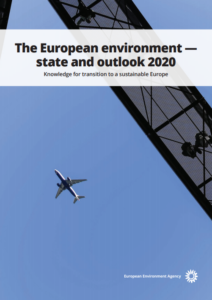The European Environmental Agency launched the “European environment – state and outlook 2020” providing information on dealing with the climate change, biodiversity loss and air and water pollution.
- EU faces persistent environmental challenges;
- Awareness about the environmental and climate crisis is increasing across society;
- Achieving sustainability transitions will depend on coherent contributions across all policy domains;
- There are opportunities to reorient the financial flows that structure Europe’s consumption and production;
- Sustainability transitions will require a detailed understanding of the systems driving environmental challenges and potential pathways to sustainability and their implications across society;
- During the forthcoming EU policy cycle, Europe’s leaders have the opportunity to shape future developments that will not be available to their successors;
2020 is a challenging year for Europe given the rise of environmental risks to health and wellbeing and the worsening of the climate.
It is reported that to deal with the challenges and overcome the barriers, a rapid and fundamental shift in the character and ambition of Europe’s responses is required.
Therefore, Europe should find alternative ways to change the key societal systems that “feed” environment and climate pressures and health impacts, improving or changing technologies and production processes and ways of living.
Europe continues to consume more resources and contribute more to environmental degradation than other world regions.
In the meantime, the report refers to Europe’s environmental policy framework — the environmental acquis — is increasingly shaped by ambitious long-term visions and targets. The overarching vision for Europe’s environment and society is set out in the Seventh Environment Action Programme (7th EAP), which envisages that by 2050:
We live well, within the planet’s ecological limits. Our prosperity and healthy environment stem from an innovative, circular economy where nothing is wasted and where natural resources are managed sustainably, and biodiversity is protected, valued and restored in ways that enhance our society′s resilience. Our low‑carbon growth has long been decoupled from resource use, setting the pace for a safe and sustainable global society.
# European environmental policies
EU’s environmental policies are based on three thematic policy priorities, such as:
- to protect, conserve and enhance the EU’s natural capital;
- to turn the EU into a resource-efficient, green and competitive low-carbon economy;
- to safeguard the EU’s citizens from environment‑related pressures and risks to their health and well-being.
Thus, the goal for 2020 remains the same: To continue on a path that puts the environment, future economic development, well-being and social cohesion at risk, or to change trajectory, setting Europe on a strong and credible development pathway to achieve a sustainable future.
It is stated that the EU along with the rest of the world is running out of time to avoid the crucial impacts on the economy and society from climate change, ecosystem degradation and overconsumption of natural resources.
The report highlights that
We are running out of time and space to adapt to such impacts. There is an urgent need to mitigate pressures more rapidly and restore ecosystems to support sustainability objectives.
Europe has only 30 years to achieve its long-term vision of ‘living well, within the limits of our planet’. 2020 to 2030 is the decade of action, meaning that European leaders have the chance to shape future developments that will not be available to their successors.
SOER 2020 points to six key areas in which bold action is needed:
- Enable transformative change across Europe
- Embrace the SDGs as an overarching framework for policymaking and implementation
- Realise the unfulfilled potential of existing environmental policies
- Develop systemic policy frameworks with binding targets
- Reorient public budgets, private investments and financial markets towards promoting sustainability transitions
- Develop knowledge and skills fit for the 21st century
To explore more click herebelow































































